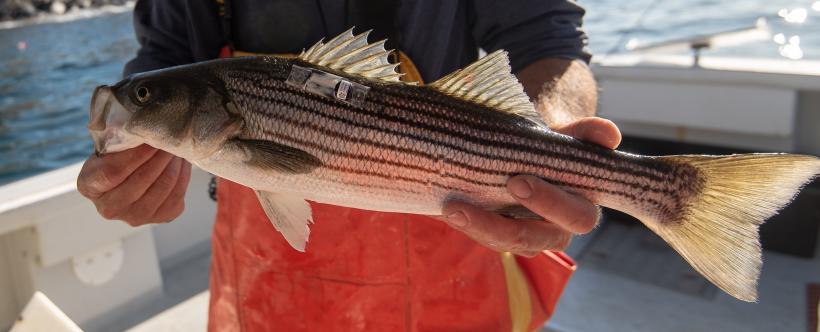Release Mortality
Due to regulations and conservation-minded anglers, most striped bass are released back to the water after being caught. Even though most of these fish survive, post-release mortality from recreational anglers causes more striped bass deaths than any other source. We conduct research to understand what affects the survival of recreationally-caught striped bass.
Between 2020 and 2021, DMF biologists tagged 349 striped bass with accelerometer transmitters, caught with live and dead bait using both circle and J-hooks. These specialized tags sense ‘tail beats’ from the fish within an array of receivers, informing researchers whether the fish dies or not. Preliminary analyses suggest that survival is related to hook location, water temperature, and handling time.
As a follow-up, we will be expanding our investigation of release mortality to include striped bass caught via artificial lures and flies. During the summers of 2023 and 2024, we will be seeking volunteer anglers to collect information when they go striped bass fishing. Follow the link below to become a Striped Bass Citizen Scientist.
The ultimate goals of this project are to evaluate the conservation benefit of using circle hooks, identify the causes of release mortality, and to provide an updated estimate of release mortality that is representative of the entire recreational fishery.
Additional Resources
- Striped Bass Citizen Scientist Project
- Using Advanced Acoustic Telemetry to Test the Conservation Benefit of Circle Hooks in the Recreational Striped Bass Fishery
- The Guide Post Podcast - Striped Bass Release Mortality and Circle Hooks, DMF Research
-
Open PDF file, 496.2 KB, How old is my striper? (English, PDF 496.2 KB)
Additional Tagging Studies
Cooperative Tagging Program
Since 1991, DMF has participated in the Striped Bass Cooperative State‐Federal Coast‐wide Tagging Study. This study is the primary data source for the estimation of mortality and coast-wide migration rates of Massachusetts tagged striped bass. Striped bass are tagged with a pink internal-anchor tag that has a sequential tag number and toll-free phone line printed on it. Over 10,000 striped bass have been tagged in this ongoing study and fish have been recaptured as far north as Nova Scotia and as far south as Ocracoke Inlet, NC.
Acoustic Tagging
In addition to the conventional tagging study, acoustic tags have helped us study the movement of striped bass in Massachusetts waters. We examine how mortality relates to habitat selection and migratory route. We track the movements of tagged striped bass with acoustic receivers in Boston Harbor, off Cape Cod, around Falmouth, in Vineyard Sound, and Buzzards Bay.
We are collaborating with the University of Massachusetts Amherst, University of Montana, and University of New Brunswick St. John to develop genetic tools to analyze genetically-derived population estimates. The creation of a genetic population baseline for striped bass will help us establish spawning population-specific mortality rates for striped bass. If you catch a striped bass with a small red tag on its belly, it means there is an acoustic transmitter in its gut cavity and to contact DMF.
Additional Resources
-
Open PDF file, 8.07 MB, Striped Bass Tags (English, PDF 8.07 MB)
Other Striped Bass Research Projects
DMF is always working to learn more about striped bass and their environment. Read about some of our previous projects.
Long Term Monitoring
DMF characterizes commercial and recreational catch to estimate population structure. Information on length, weight, sex, and scales are collected. Each year, we receive information and samples from about 400-800 commercially caught and roughly 1,200-2,000 recreationally caught striped bass. Samples come from seafood dealers and from Sportfish Angler Data Collection Team volunteers. Our age and growth laboratory uses the growth rings on scales to estimate age composition of catch and rates of growth.
